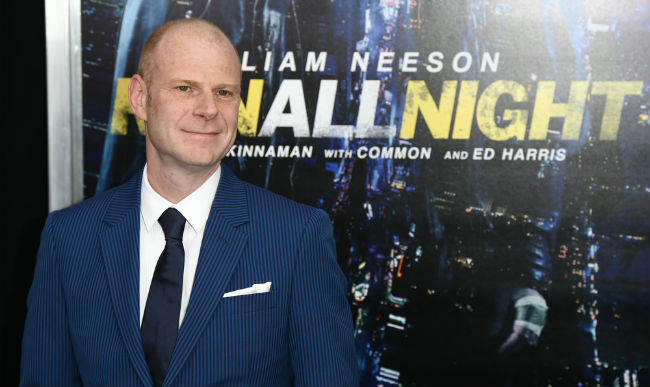
Tom Holkenborg, better known as Junkie XL, is well-known for his work in electronic music, but increasingly his work can be heard at movie theaters. Since 2005, he’s worked closely with Hans Zimmer, contributing to the scores of Man of Steel, Inception, and other projects. Holkenborg also provided thunderous music for Mad Max: Fury Road and, most recently, the score to Deadpool. Holkenborg talked to us about his composing career, and how you score a movie anchored by, in his words, a “lunatic idiot.”
You’ve had a long career before you got to film. What did you first draw on with your work composing scores?
Around ‘98, a track of mine was licensed and the way it was used really sparked my imagination. I wanted to pursue that. I’d been playing in bands since the ‘80s, so in the early 2000s, I moved to L.A. to pursue film scoring. I thought, “Let’s go to L.A. and compose for movies!” It was a little more complicated than that, it turns out! [Laughs.] My first break was with Harry Gregson-Williams and Domino, and I’ve always been grateful for that.
What are some differences between producing an album and producing a score?
It’s not making the music. It’s all about things like time management, dealing with the politics, knowing when to write music and when to stop writing. It’s a lot to do with things that have nothing to do with music, and that’s the stuff I didn’t know. It was so great to learn from composers like Hans Zimmer.
How did you meet Hans Zimmer? At first it seemed you two were an unusual collaboration.
We met a few times when I was in L.A., and we always liked each other. He wanted me to work on Inception, so I combined a few themes to create a sort of remix, not something for the dance floor, but something for the movie. That worked out really well, and we started doing more together.
As a composer, what’s your process when working with a director?
Every director is different. They all have a different thought process. As a composer, you have to switch gears. Every director is unique. That’s what’s so challenging about being a film composer: You learn so much from these brilliant individuals. Especially when you talk to composers who have been around for a long time, working with all these directors makes your experiences so rich, you immediately recognize what director you’re going to deal with. I’m looking forward to that experience, where it becomes that collaboration.
And then you collaborated more closely on Man of Steel. What drove your musical choices on that?
Hans and I think the same way. These superheroes are bigger than us all. It always goes back to Greek mythology and demigods. People have always wanted to read about people with supernatural powers. It almost made no sense to look at the scores of the last 20 years; you had to give it all you have. We know in 50 years from now, when both of us are dead, someone else will have a new take. It’s the same with the classic Shakespeare story; in 200 years, somebody will do something new with Macbeth.
And then you have an anti-hero like Deadpool…
[Chuckles.] Deadpool is one of the hardest movies I’ve worked on because of that. It’s all about the sequential emotions you need to score. What music do you make for a character who’s happy one moment and sad the next? The great thing about the movie is that it’s a complete standalone movie. It has a root in the X-Men, but how we approached everything, it’s a complete animal on its own. That’s why it’s so great to be part of this, and compose music for this lunatic idiot.
https://www.youtube.com/watch?v=aqJevf56POQ
How do you compose for somebody that insane?
For me, I was like, “Okay, how do I come up with something for this guy?” And I remember waking up and playing some old Miami Vice stuff on my iPod, and realizing I needed to mix it with Michael Jackson and Frankie Goes to Hollywood. I said, “Tim [Miller], I have it! We’ll do Miami Vice meets Michael Jackson and Frankie Goes to Hollywood on speed!” I spent a week doing a demo and we played a small piece of music over the freeway fight. It worked!
That’s a pretty interesting mix of music, right there.
To find the inspiration for something like Deadpool, you can’t draw from scores. That’s why I reference music that exists that doesn’t draw from a movie. On Mad Max, I talked with George Miller about neoclassicism in the ‘50s in the last century. It doesn’t always make sense to dig into film scores. I find the most inspiration in cooking. It refreshes my mind completely, I feel energized.
You mentioned pop music, and Deadpool uses quite a bit of it. How closely do you work with the music supervisor?
We do talk about it. They do ask my opinion about it. The director himself had a lot of ideas, and John Houlihan, the music supervisor, as a composer, you’re asked an opinion. On certain movies, like Divergent, there’s so many songs in there, part of the job of the supervisor is to deal with the legal side of things. It’s not that easy, you can’t do that and compose!
Since you mentioned cooking, I’ve got to ask: What’s a dish inspired by Deadpool?
A burger without a bun with some yogurt on it and some chocolate on, something unheard of, but not good. [Laughs.]
Deadpool, and its soundtrack, are out now.






